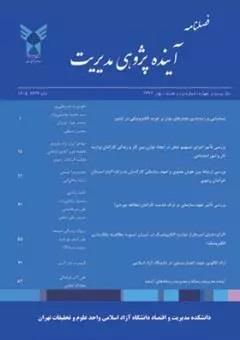آینده پژوهی آموزش صلح با رویکرد سناریونویسی
محورهای موضوعی : آینده پژوهیفرح ناز فیله کش دوغ آبادی 1 , احمد اکبری 2 , علی معقول 3 , محمد کریمی 4
1 - دانشجوی دکتری دانشگاه آزاد
2 - استادیار، عضو هیات علمی رشته مدیریت آموزشی دانشگاه آزاد اسلامی، نیشابور، ایران.
3 - استادیار، عضو هیات علمی رشته مدیریت آموزشی دانشگاه آزاد اسلامی، نیشابور، ایران.
4 - استادیار، عضو هیات علمی رشته مدیریت آموزشی دانشگاه آزاد اسلامی، نیشابور، ایران.
کلید واژه: آینده پژوهی, سناریونویسی , هوش فرهنگی.,
چکیده مقاله :
آموزش صلح، با تمرکز بر شاخصهایی چون دانش، مهارت ها، نگرش ها موجب تغییر رفتار می شود و افراد بالغ را قادر سازد که از کشمکش و خشونت پرهیز کرده و تضادها را به صورت صلح آمیزی حل کنند و یکی از سازمان مهم که نقش بسزایی در تعلیم و تربیت و همچنین خلق ارزش های پایدار در جامعه دارد دانشگاه می باشد. روش تحقیق، از نوع پژوهش کیفی و منطبق بر رویکرد شبه عددی یا قضاوتی در حوزه روش های آینده پژوهی است. ابزار سنجش مقالات معتبر پایگاه های داخلی و خارجی ، اسناد کتابخانه ای، تدوین پرسشنامه ها در دو مرحله با استفاده از تکنیک دلفی بوده است. در این تحقیق پنل دلفی،20 نفر از افراد متخصص در حوزه ی آموزش و ارتباطات در رشته های علوم تربیتی و علوم انسانی بوده است که به صورت قضاوتی توسط محققین انتخاب شده اند. جهت تحلیل ساختاری از روش ماتریس ضرایب تحلیل اثر متقاطع به کمک نرم افزار میک مک استفاده شده. یافته های تحقیق نشان داد که عوامل فرهنگی، محیطی، آموزشی و رسانه ایی بیشترین تاثیرگذاری را بر هوش فرهنگی دارند که بر اساس آنها چهار سناریو به نام های کرامت انسانی مبتنی بر آموزش صلح، آموزش صلح نمادین و ناپایدار، هژمونی یا فروپاشی نظام آموزش و آموزش صلح بستر تربیت شهروند جهانی نگارش گردیده است. پیش بینی آینده در خصوص آموزش صلحی می تواند تعارضات را در سطح مدارس، دانشگاه ها و سایر موسسات آموزشی کاهش دهد و جامعه را به سمت رشد و توسعه پایدار سوق دهد.
Background: Peace education changes behavior and enables adults to avoid conflicts and violence and resolve them peacefully by focusing on indices such as knowledge, skills, and attitudes. University is an important organization that plays a significant role in education and creating sustainable values in society.. Methods: The research method was qualitative and according to the quasi-numerical or judgmental approach in the field of futures research methods. The measurement tools included authentic domestic and foreign articles, field studies and documents, and were based on the development of questionnaires in two stages using the Delphi technique. This Delphi Panel methodology consisted of 20 education and communication experts in educational sciences and humanities, and they were selected by the researchers using a judgmental method. The matrix of cross-impact analysis coefficients was used with the help of MICMAC software for structural analysis. Findings: The research findings, including 94 primary codes or indices and 11 components indicated that cultural, environmental, educational, and media factors had the highest effects on cultural intelligence, and thus four scenarios were developed, namely human dignity based on peace education, symbolic and unstable peace education, hegemony or the collapse of the education system, and peace education as the basis of global citizenship education. Conclusion: Futures research can forecast the future of peace education with the greatest accuracy and the least uncertainty. The future forecast of peaceful education can reduce conflicts at schools, universities, and other educational institutions and lead society towards sustainable growth and development.


